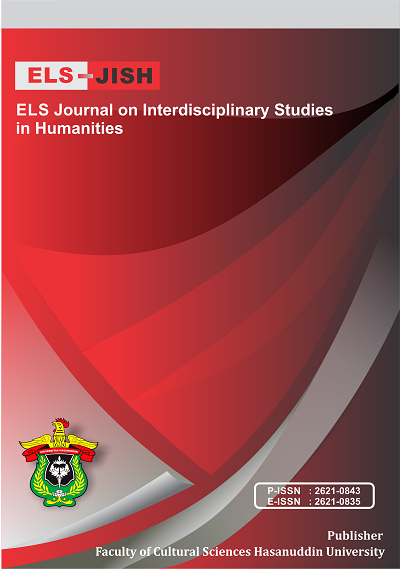Impact of the Process Genre Approach on the Management Students’ Business Writing Skills
DOI:
https://doi.org/10.34050/els-jish.v3i2.9721Keywords:
BUSINESS WRITING SKILLS, BUSINESS WRITING, PROCESS-GENRE APPROACH, MANAGEMENT STUDENTS.Abstract
In the present corporate world, it is prominent to hone business writing skills among students for becoming good management professionals. Writing is foremost and significant skill in the business world, but most of the students lack proficiency in their writing. The present paper attempts to explore the impact of the process genre approach in teaching business writing skills to the management professionals. The sample of the study consists of 40 management students from a professional college and 32 teachers of English who were working in sixteen different professional colleges. In order to collect the data, the questionnaires were administered to the students as well as to the teachers. Post analysis of the data, it was found that management students’ business writing skills had a positive impact when the process-genre approach incorporated in teaching and learning processes. Hence, it is concluded that the use of the process genre approach for teaching business writing to the management students during the intervention had become successful in achieving the desired goal. It also aided the students in developing better writing proficiency and enhancing their business writing skill.
References
Azhar, M.A., Kiran, S. & Khan, T. (2016). Teaching writing skill based on process genre approach in community learning context. From proceedings of SOCIOINT 2016 3rd International Conference of Education, Social Sciences and Humanities. Downloaded from http://www.ocerint.org/socioint16_e-proceedings/abstracts/papers/336.pdf
Badger, R., & White, G. (2000). Product, process and genre: Approaches to writing in EAP. ELT Journal, 54(2), 153-160.
Bandura, A. (1982). Self-efficacy mechanism in human agency. American Psychologist, 37(2), 122-147. http://dx.doi.org/10.1037/0003-066X.37.2.122
Bandura, A., & National Inst of Mental Health. (1986). Prentice-Hall series in social learning theory. Social foundations of thought and action: A social cognitive theory. Englewood Cliffs, NJ, US: Prentice-Hall, Inc.
Bhatia, V. (1993). Analyzing Genre: language use in professional settings. London: Longman.
Brown, H. D. (1994). Teaching by principles: An interactive approach to language pedagogy. Englewood Cliffs, NJ: Prentice Hall Regents.
Feez, S. & Joyce, H. (1998). Text-based syllabus design. Sydney: National Centre for English Language Teaching and Research, Macquarie University.
Flower, L. & Hayes, J. (1981). A cognitive process theory of writing. College Composition and Communication, 32,365-387.
Hyland, K. (2003). Second language writing. New York: Cambridge University Press.
Hyland, K. (2003). Genre-based pedagogies: A social response to process. Journal of Second Language Writing, 12, 17-29.
Kroll, B. (1990). What does time buy? ESL students’ performance on home versus class compositions. In B. Kroll (Ed.), Second language writing: Research insights for the classroom. Cambridge: Cambridge University Press.
Mohamed Kassem, M. A. (2017). Developing business writing skills and reducing writing anxiety of EFL learners through Wikis. English Language Teaching, 10(3), 151-164.
Nordquist, R. (2018, June 17). What is business writing? Definition, tips and examples. Retrieved from https://www.thoughtco.com/what-is-business-writing-1689188
Nunan, D. (1999). Second language teaching and learning. Boston: Heinle & Heinle Publisher.
Pujianto, D., Emilia, E. & Sudarsono, M.I. (2014). A process-genre approach to teaching writing report text to senior high school students. Indonesian Journal of Applied Linguistics, 4(1), 99-110.
Reonal, A.M. (2015). Process-genre approach in teaching expository writing in secondary ESL classes. International Journal of Social Science and Humanities Research. 3(3), 187-191.
Richards, J. & Renandya, W. (2002). Methodology in language teaching: an anthology of current practice. Cambridge: Cambridge University Press.
Swales, J. M. (1990). Genre analysis: English in academic and research settings. Cambridge: Cambridge University Press.
Swain, M. (1997) Collaborative dialogue: Its contribution to second language learning. Revista Canaria de Estudios Ingleses, 34,115-32.
Swain, M. (2000) The output hypothesis and beyond: Mediating acquisition through collaborative dialogue. In J.P. Lantolf (ed.) Sociocultural Theory and Second Language Learning (pp. 97-114). Oxford: Oxford University Press.
Tangekiengsirisin, S. (2006). Approaches to teaching second language writing. Language institute journal, 3, 1-26.
Tribble, C. 1996. Writing. Oxford: Oxford University Press.
Vygotsky, L. S. (1978). Mind in society: The development of higher psychological processes. Cambridge, MA: Harvard University Press.






